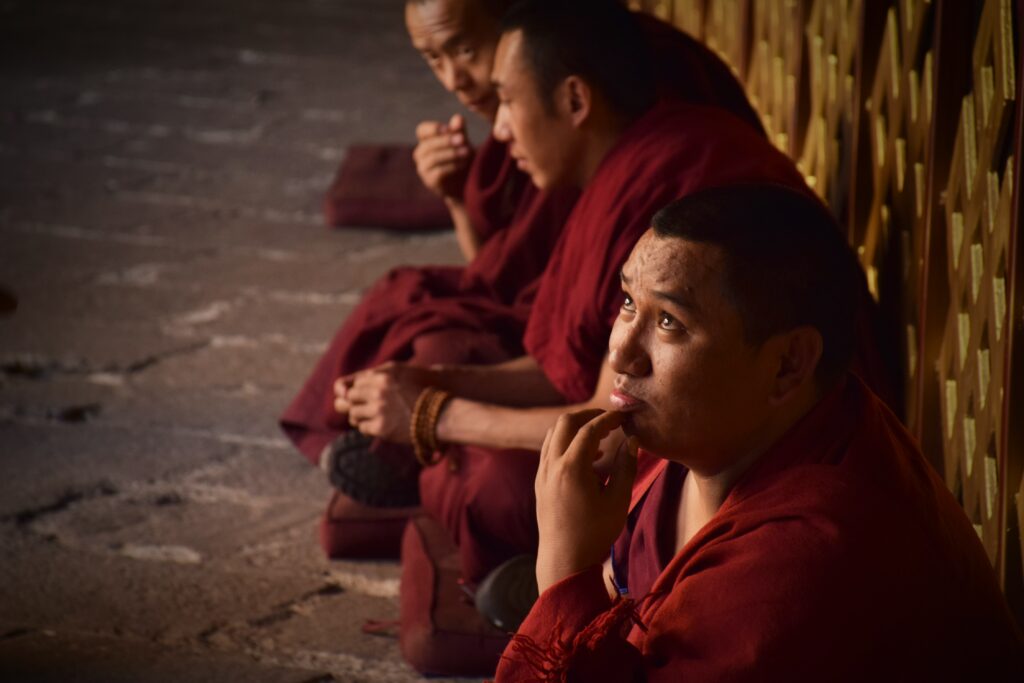Order from Chaos
Editor’s note: this post was revised and updated on 9 April 2023.
In the heathen worldview, there are two important concepts that are often referenced: innangarðr (Old Norse “within the enclosure,” pronounced “INN-ann-guard”) and útangarðr (Old Norse “beyond the enclosure”, pronounced “OOT-ann-guard”). “A place or a state of mind is innangarðr if it’s orderly, civilized, and law-abiding. If, on the other hand, it’s chaotic, wild, and anarchic, it’s útangarðr.”
Consider nature. We live on a planet – and likely in a universe – in which most everything exists to be food for something else. Males tend to seek dominance in the form of mating rights, and will kill other males – and sometimes the offspring of other males – to ensure that only their genes move forward. And for all life, survival is a matter of adapting to a changing world; failure to do so results in unceremonious extinction.
This is the reality of life.
The need for tribes
People are primates, which are social animals. To help us stay alive, we need to get along with the rest of the group. There is no one set of rules that everyone should follow. Instead, morality depends on the situation, and people have evolved to behave properly in small groups. So, people got together in families and tribes, and that’s how we made some kind of order out of the chaos.
Despite the fact that many of us genuinely love “the great outdoors,” we couldn’t live there for very long, especially if we were alone. The need to find food, survive against those in the wild who might find us appetizing, and endure the scorching heat and bitter cold would all present challenges that most of us aren’t equipped to handle. But the majority of us are good at surviving in our world—we know not to fart in public while eating, we can drive cars and follow traffic laws, we can use computers, and we shake hands with people we meet. We know how to get by in society.
To the ancient heathen, our world was our group: our family, our clan, our tribe. This group was innangarðr, a place of order that we humans have carved out of the chaos. Everything else, including the innangarðr of people who were “not us” was útangarðr.
The larger structure
In 1829, French mythographer Georges Dumézil proposed the tripartite ideology of Proto-Indo-European society. This idea purports that Proto-Indo-European society comprised three main groups corresponding to three distinct functions:
- the function of sovereignty
- the military function
- the function of productivity
Norse pagan author Edred Thorsson suggests that these roles in Norse mythology are served by Tyr and Odin as sovereigns, Thor as the military deity, and with Freyja and Freyr representing productivity.
Thorsson places two gods in the sovereign slot because, in his opinion, Odin represents the “primal law” (orlog) while Tyr represents the laws of man. Tyr is the “god of the Thing,” the heathen assemblies in which free people gathered to make laws and settle disputes. Odin, on the other hand, often seems to operate outside of the bounds of heathen traditions; this is assumed to be because he operates on a grander scale.
Simplistically, this, then, is how the heathen views his or her world; there is chaos, and then there is that which we have carved out of the chaos. In modern society, we seek consensus across broad swathes of peoples, cultures, and conditions; we strive for the impossible. How readily do you think a suburban New Englander accountant could “build consensus” with a Hispanic gang member living on L.A.’s South Vermont Avenue? How likely is the average American Christian to talk an Islamic Jihadist into his or her way of thinking? The world is full of differences, and while it is important that we provide room for different views, we also sometimes need to retreat to the safe place of people who share our own.
The need for modern tribes
The small group of friends that consist of my innangarðr have many things in common and can agree on many things; we generally have the ability to find consensus. I’m certain that I could have any of them as overnight guests in my house without the slightest fear that they’d try and slit my throat in my sleep. Why? Because they are law-abiding citizens; they are people who have homes and hold down jobs and pay taxes. Further, they are people with whom I have had many conversations; I know that they have the capacity for reason and that they have made life-choices that have put them on paths similar to my own.
Unfortunately these same traits make it all too easy for political and religious leaders to cast anyone with whom they disagree as an enemy, and their rhetoric is all-too-easily accepted by we humans who have evolved as tribal creatures. However, we have larger brains and therefore a larger responsibility; we can choose not to behave like animals and therefore we have a responsibility to do so. We can benefit from the sense of belonging that our modern tribes provide without using it as an excuse to act like apes.
The Bottom Line
Bottom line, we need our “tribes,” our innangarðr because hundreds of thousands of years of evolution can’t be undone in a few thousand years.
Heathenry and paganism gives us one way to conceptualize the incongruity of pack animals (us) living in a globally-aware society, but one need not specifically be a heathen or pagan to learn from the ancestors. We should cultivate our innangarðr relationships; we should understand and appreciate that we humans inherently need people who we can truly trust to have our backs. We need our little islands of order amid the chaos, and the philosophy of the ancient heathen provides a cultural context around which we can build them.














Post Comment